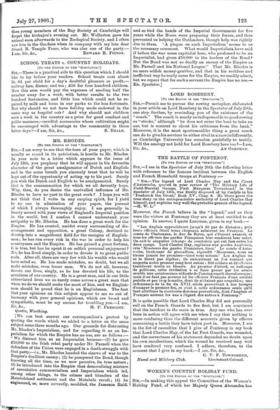MR. RHODES.
[TO THE EDITOR OF THE "SPECTATOR."] Sra,—I am sorry to see that the tone of your paper, which is usually so sound in its patriotism, is hostile to Mr. Rhodes. In your note to a letter which appears in the issue of July 13th, you prophesy that he will appear in his favourite character of the great amalgamator of Dutch and English, and in the same breath you sincerely trust that he will be kept out of the opportunity of acting up to his part. Surely you wish the Dutch and English to be amalgamated. Surely that is the consummation for which we all devoutly hope. Why, then, do you desire the unrivalled influence of Mr. Rhodes to have no part in the great work ? I hope you will not think that I write in any carping spirit, for I yield to no one in admiration of your paper, the perusal of which I always thoroughly enjoy. I am generally in hearty accord with your views of England's Imperial position in the world, but I confess I cannot understand your antipathy to Mr. Rhodes. He has done a great work for the Empire. He has created, amidst every surrounding of dis- couragement and opposition, a great Colony, destined to develop into a magnificent field for the energies of English- men; he has run every risk in the war in order to help his countrymen and the Empire. He has gained a great fortune, it is true, but has he spent it on selfish personal enjoyment? No, he has lived simply, in order to devote it to great public ends. After all, there are very few with his wealth who would have acted so. He has made mistakes, no doubt, but we all make mistakes, even lesser men. We do not all, however, devote our lives, singly, as he has devoted his life, to the greatness of our country. He is a great man, and in our little abbreviated lives we so rarely come across a great man that when we do we should make the most of him, and we English- men should be proud that he is an Englishman. The fact that your opinions on this subject appear to me so out of harmony with your general opinions, which are broad and sympathetic, must be my excuse for troubling you.—I am, [We can best answer our correspondent's protest by quoting the words which we added to a letter on the same subject some three months ago. Our grounds for distrusting Mr. Rhodes's Imperialism, and for regarding it as an Im- perialism for which the Empire has no use, are as follows :— " We distrust him as an Imperialist because—(1) he gave £10,000 to the Irish rebel party under Mr. Parnell when the defenders of the Union were engaged in a death-struggle with that party,—i.e., Mr. Rhodes handed the sinews of war to the Empire's deadliest enemy; (2) he pampered the Bond, though knowing all the time, as we now perceive, its true nature ; (3) he introduced into the Empire that demoralising mixture of speculative commercialism and Imperialism which led, among other things, to the crimes and blunders of the Matabeleland settlement and the Matabele revolt; (4) he engineered, or, more correctly, muddled, the Jameson Raid, and so tied the hands of the Imperial Government for five years while the Boers were preparing their forces, and thus prevented us helping the Outlanders, though help was rightly due to them. A plague on such Imperialism' seems to us the necessary comment. What would Imperialists have said if before the war some capitalist here, who professed to be an Imperialist, had given £10,000 to the leaders of the Bond? But the Bond was not so deadly an enemy of the Empire as Mr. Parnell and his National League." That Mr. Rhodes is no mere selfish money-grubber, and that in his reckless and inefficient way he really cares for the Empire, we readily admit, but we repeat that for such a servant the Empire has no use.— ED. Spectator.]


































 Previous page
Previous page